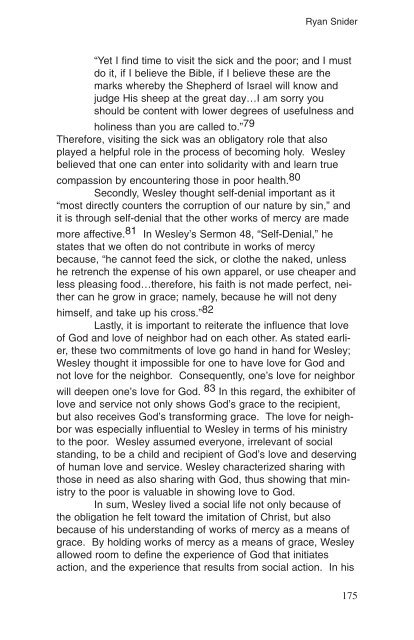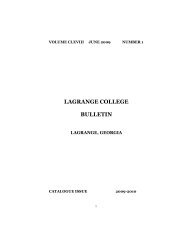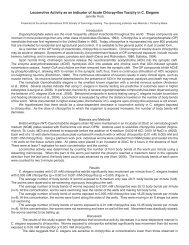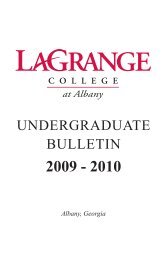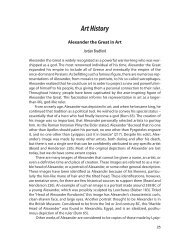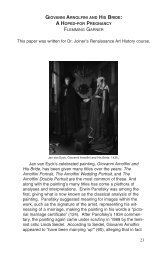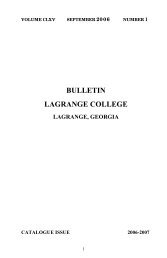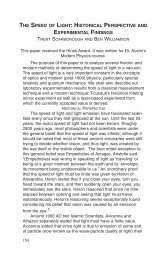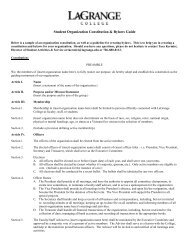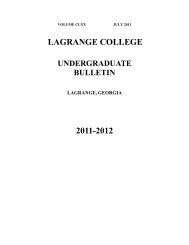Works of Mercy as a Vital Component to Sanctification - LaGrange ...
Works of Mercy as a Vital Component to Sanctification - LaGrange ...
Works of Mercy as a Vital Component to Sanctification - LaGrange ...
You also want an ePaper? Increase the reach of your titles
YUMPU automatically turns print PDFs into web optimized ePapers that Google loves.
Ryan Snider<br />
“Yet I find time <strong>to</strong> visit the sick and the poor; and I must<br />
do it, if I believe the Bible, if I believe these are the<br />
marks whereby the Shepherd <strong>of</strong> Israel will know and<br />
judge His sheep at the great day…I am sorry you<br />
should be content with lower degrees <strong>of</strong> usefulness and<br />
holiness than you are called <strong>to</strong>.” 79<br />
Therefore, visiting the sick w<strong>as</strong> an obliga<strong>to</strong>ry role that also<br />
played a helpful role in the process <strong>of</strong> becoming holy. Wesley<br />
believed that one can enter in<strong>to</strong> solidarity with and learn true<br />
comp<strong>as</strong>sion by encountering those in poor health. 80<br />
Secondly, Wesley thought self-denial important <strong>as</strong> it<br />
“most directly counters the corruption <strong>of</strong> our nature by sin,” and<br />
it is through self-denial that the other works <strong>of</strong> mercy are made<br />
more affective. 81 In Wesley’s Sermon 48, “Self-Denial,” he<br />
states that we <strong>of</strong>ten do not contribute in works <strong>of</strong> mercy<br />
because, “he cannot feed the sick, or clothe the naked, unless<br />
he retrench the expense <strong>of</strong> his own apparel, or use cheaper and<br />
less ple<strong>as</strong>ing food…therefore, his faith is not made perfect, neither<br />
can he grow in grace; namely, because he will not deny<br />
himself, and take up his cross.” 82<br />
L<strong>as</strong>tly, it is important <strong>to</strong> reiterate the influence that love<br />
<strong>of</strong> God and love <strong>of</strong> neighbor had on each other. As stated earlier,<br />
these two commitments <strong>of</strong> love go hand in hand for Wesley;<br />
Wesley thought it impossible for one <strong>to</strong> have love for God and<br />
not love for the neighbor. Consequently, one’s love for neighbor<br />
will deepen one’s love for God. 83 In this regard, the exhibiter <strong>of</strong><br />
love and service not only shows God’s grace <strong>to</strong> the recipient,<br />
but also receives God’s transforming grace. The love for neighbor<br />
w<strong>as</strong> especially influential <strong>to</strong> Wesley in terms <strong>of</strong> his ministry<br />
<strong>to</strong> the poor. Wesley <strong>as</strong>sumed everyone, irrelevant <strong>of</strong> social<br />
standing, <strong>to</strong> be a child and recipient <strong>of</strong> God’s love and deserving<br />
<strong>of</strong> human love and service. Wesley characterized sharing with<br />
those in need <strong>as</strong> also sharing with God, thus showing that ministry<br />
<strong>to</strong> the poor is valuable in showing love <strong>to</strong> God.<br />
In sum, Wesley lived a social life not only because <strong>of</strong><br />
the obligation he felt <strong>to</strong>ward the imitation <strong>of</strong> Christ, but also<br />
because <strong>of</strong> his understanding <strong>of</strong> works <strong>of</strong> mercy <strong>as</strong> a means <strong>of</strong><br />
grace. By holding works <strong>of</strong> mercy <strong>as</strong> a means <strong>of</strong> grace, Wesley<br />
allowed room <strong>to</strong> define the experience <strong>of</strong> God that initiates<br />
action, and the experience that results from social action. In his<br />
175


